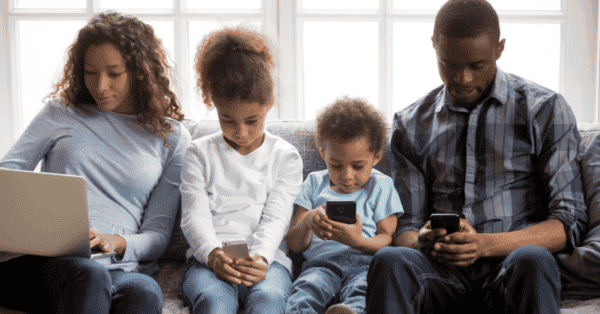How can I spot when my child has had ‘too much’ screen time?
Van de oorspronkelijke houding van de American Academy of Pediatrics (1999) met vermelding van geen schermtijd voor kinderen jonger dan twee, later bijgewerkt naar een meer genuanceerde benadering (2016) in het toestaan van beperkte hoogwaardige inhoud voor kinderen, weten we nu dat alle schermtijd niet gelijk is.
The Royal College of Pediatrics and Child Health suggest that parents approach screen time “based on the child’s developmental age, the individual need and value the family place on positive activities such as socialising, exercise and sleep.”
Dit goedbedoelde advies voor gezinnen verlicht bezorgdheid (en schuldgevoelens) met betrekking tot schermgebaseerde activiteiten, toont de positieve impact van technologie aan en stelt ouders in staat zich te concentreren op de context en inhoud van de schermtijd in plaats van alleen tijdslimieten.
But some parents and carers may still want to know: “when has my child had ‘too much’ screen time?”
As families and children differ, so does the effects of screen time. However, all parents can use these tips as a guideline.
Bekijk hoe uw kind met zijn apparaat omgaat
- Heeft mijn kind een driftbui wanneer het apparaat wordt verwijderd of het scherm wordt uitgeschakeld?
- Klaagt mijn kind over nekpijn of rugpijn?
- Klaagt mijn kind over hoofdpijn of vermoeide ogen?
- Wordt mijn kind agressief of boos tijdens het spelen of online kijken?
- Lijkt mijn kind vaak te opgewonden?
- Is mijn kind ongeorganiseerd, ongehoorzaam of oppositioneel geworden?
Als het antwoord op de meeste van deze vragen 'Ja' is, moeten ouders overwegen om schermtijdactiviteiten aan te vullen met iets anders.
Recognise when screen time negatively impacts children’s development
- Verbindt mijn kind sociaal met familie en vrienden?
- Is mijn kind fysiek gezond en slaapt het genoeg?
- Is mijn kind bezig met en te bereiken op school?
- Nastreeft mijn kind interesses en hobby's (in welke vorm dan ook)?
- Heeft mijn kind plezier en leert het in het gebruik van digitale media?
If the answer to the majority of these questions is ‘No’, then parents may need to place limits on screen-based activities.
See more ways to manage screen time and tackle ‘too much’ of it.


